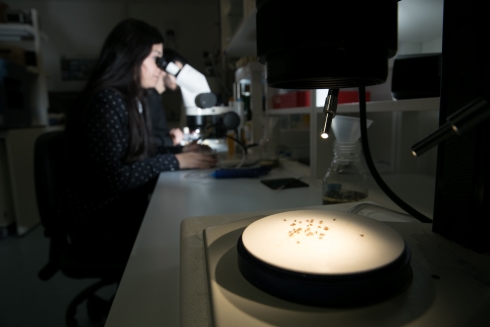My Lab Unlocked: Professor Ruben Cauchi FRSB

Professor Ruben Cauchi FRSB discusses motor neurone disease research at his lab in Malta —and how the micronation's small island population is a goldmine for the discovery of genes linked to the disease.
Drosophila melanogaster is probably the most studied creature in the world and fly labs are therefore as ubiquitous as the fruit flies they rear and breed. Not so on the tiny island of Malta, where my laboratory is the only one that ‘exploits’ these bugs to better understand a devastating disease. We study the genes that are mutated in motor neurone disease (MND), the relentless neurodegenerative condition that cripples voluntary movement in middle age.
Flies are the perfect organisms to study age-related neurological disease. In addition to the astonishing genetic overlap with humans, they age quickly and are cheap to maintain. A dent in the great acrobatic nature of these creatures is also easy to observe. This allows us to confirm the involvement of a gene in the disease process simply by looking for MND-like symptoms in flies. The generosity of the fly community, expressed through the sharing of resources such as strains —mostly via post— erodes any feelings of insularity on our island microstate at the southern tip of Europe.
I was introduced to the fly world over a decade and a half ago at the University of Oxford where I obtained my DPhil. Subsequent to my postdoctoral research in the MRC Laboratory of Molecular Biology at the University of Cambridge, I used the knowledge I gained to build a fly lab in Malta. Today I lead a dynamic team, and despite my increased managerial, administrative, and teaching duties, you will still find me in the lab squinting through a stereomicroscope to select and mate flies to do experiments.
The lack of a physical link with the European continent makes the Maltese population a goldmine for studying the genetics of a disease. Working closely with clinicians, I have established a biobank of samples from Maltese MND patients, and we have dug into the epidemiology of this disease on the Maltese archipelago. Surprisingly we find that Malta has one of the highest incidence rates of this condition in Europe. This, coupled with a genetic architecture that appears to be different in MND patients living in Malta compared to their European counterparts, hints at a founder effect. My lab now finds itself scouting the unique Maltese genetic pool to discover elusive MND genes and going back to flies for validation and mechanism discovery.

The big challenges in our area of research concern the mining of big data, including genomes from patients to identify causative or risk gene variants in coding and non-coding regions. We thus seek collaborations with bioinformaticians. We are privileged to from part of Project MinE, an international landmark study that aims at understanding the broad genetic risk factors that lead to MND. Ground-breaking gene discoveries through this collaborative initiative are our lab’s proudest moments.
Translating genes into desperately required treatments remains the ultimate frontier. Previous successes in treating spinal muscular atrophy, a form of motor neurone disease that affects infants, have given a much needed boost to our field. The direction taken by my lab in the last few years has spurred us to engage more with society. Through organisation of public meetings open to researchers, clinicians and, the MND patients themselves, in addition to constant engagement with the media, we have succeeded in raising awareness on a deeply distressing condition. The impact of our research and the difference it can make to patients’ lives fires us up every day.

Professor Ruben Cauchi FRSB is an Associate Professor of Neurogenetics at the University of Malta in Valletta, Malta.


